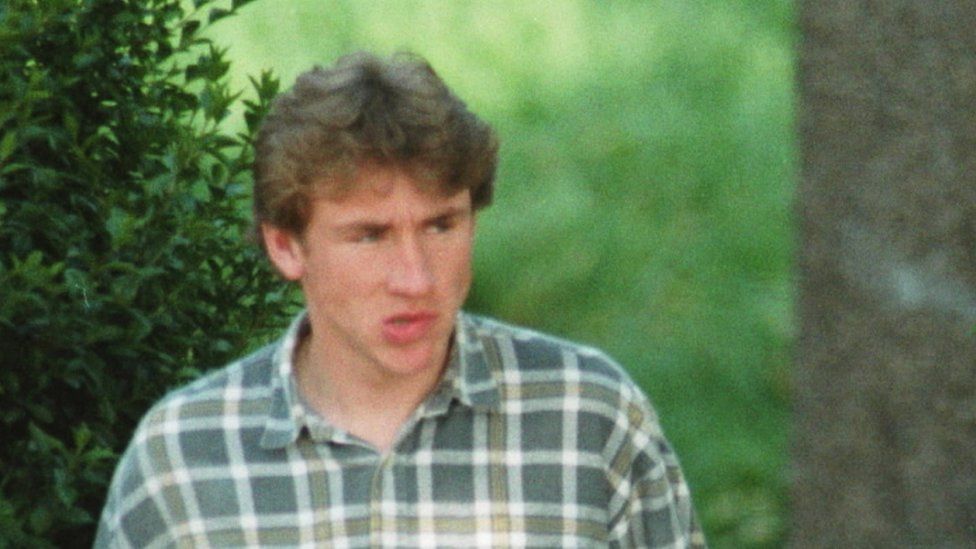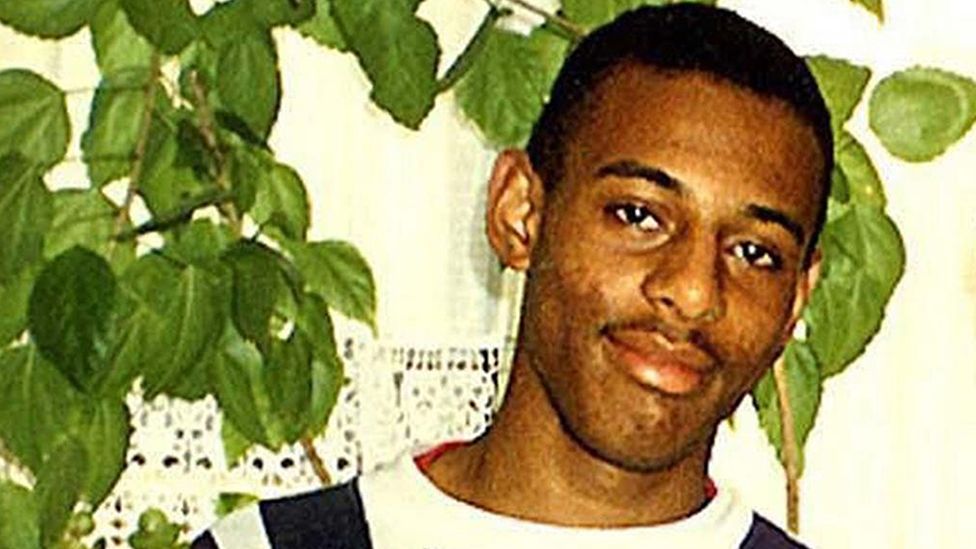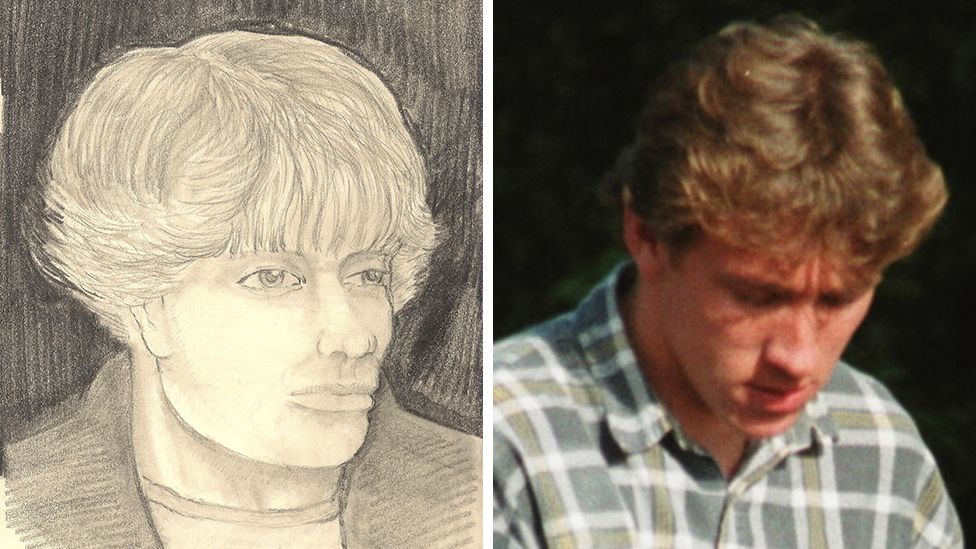Evidence about Matthew White, now dead, implicates other suspects and reveals more police failings.

A major suspect in the Stephen Lawrence murder is publicly named today for the first time, after a BBC investigation.
He is Matthew White, who died in 2021, aged 50. The BBC has found the Met Police seriously mishandled key inquiries related to him.
In response, the Met has taken the almost unprecedented step of naming White as a suspect.
“Unfortunately, too many mistakes were made in the initial investigation,” says Scotland Yard.
“The impact of them continues to be seen,” reads the statement from Deputy Assistant Commissioner Matt Ward.
The murder of Stephen Lawrence 30 years ago is the UK’s most notorious racist killing. The failure of the first police investigation prompted a landmark public inquiry which concluded the Met was institutionally racist.
Aged 18, Stephen was stabbed to death by a gang of young white men in Eltham, south-east London, in April 1993. He had been waiting for a bus with his friend Duwayne Brooks.
The evidence against White gathered by the BBC raises questions about Scotland Yard’s 2020 decision to stop investigating the case and implicates other suspects who remain free.

Image source, Family Handout
Five prime suspects became widely known after the murder, but the public inquiry said there were “five or six” attackers.
David Norris and Gary Dobson were given life sentences for the murder in 2012. The other three – Luke Knight and brothers Neil and Jamie Acourt – have not been convicted of the crime.
The Met Police has consistently said there were six attackers, as Duwayne Brooks said on the night.
In 2020, Commissioner Cressida Dick declared the case “inactive”, saying that all identified lines of inquiry had been followed. The commissioner said she had assured Stephen’s family that police would investigate any new information.
The BBC decided to re-examine the case itself, tracing witnesses, getting sight of police documents, and piecing together 30 years of evidence.
Our investigation revealed evidence of White’s central role in the case. He was initially known publicly as Witness K, granted this alias despite never really co-operating with police. In 2011, he was named publicly for the first time at the trial of Norris and Dobson, but only as a witness.
But we found that witnesses had said White told them he had been present during the attack, that evidence showed his alibi was false, and that police surveillance photos of White showed a resemblance to eyewitness accounts of an unidentified fair-haired attacker.
The BBC investigation reveals:
- A relative of White tried to speak to the Met after the murder, but wrong information was entered into the police database and the lead was not pursued. When eventually traced by police 20 years later, the relative said White had admitted being present during the attack
- Another witness told police in 2000 that White had admitted being part of the attack. The Met again failed to trace White’s relative, who could have independently corroborated White’s admission that he was there
- The Met was asked in 1997 by another police force to consider whether White could have been present during the murder and then formally told to establish his role in the case, but this recommendation was not properly followed
- White lied to police about where he had first heard about the attack and his alibi was false, but detectives accepted his claims
- In 1993 White looked like the prominent unidentified attacker described by Stephen’s friend Duwayne Brooks, but the Met failed to share the description with all investigators
- Clive Driscoll, the officer who convicted two of Stephen’s killers, said Cressida Dick suggested in 2012 he should not bother going after the other suspects, even though the trial judge had urged police to pursue them. Mr Driscoll went on to arrest White, but was then made to retire before he could complete his investigation
Responding to the BBC, the Met Police said White was arrested twice, in 2000 and 2013, and that files were sent to the Crown Prosecution Service in 2005 and 2014. But on both occasions prosecutors said there was no realistic prospect of conviction.
The force said the handling of the approach by White’s relative in 1993 was “a significant and regrettable error”.

New evidence about the murder of Stephen Lawrence, uncovered by BBC investigative reporter, Daniel De Simone.

Lord Sentamu, the former Archbishop of York and an adviser to the 1998 Macpherson Inquiry into Stephen’s murder, told the BBC that “we were misled” because of the wrong information on the police database about White’s relative. It is “absolutely shocking”, he said.
He said the “murder would have been resolved” in the 1990s had the Met followed leads on White properly.
He also revealed Sir William Macpherson, head of the inquiry, privately asked the Met what was being done to investigate White, but the inquiry did not receive an answer.
Former Det Ch Insp Driscoll told the BBC that the evidence showed that White had to be considered as the fair-haired attacker described by witnesses. “Short of a signed confession, I don’t know what else you’d want,” he said.
He said the Met should complete the investigation “for its own dignity and sanity”.
But Dr Neville Lawrence, Stephen’s father, said any further police inquiry should be conducted by another force. “They must be able to find a decent police force who could investigate,” he told the BBC.

Although Matthew White, a drug user, died the year after the Met stopped investigating, the evidence further implicates the three prime suspects who are still alive.
The witness in 2000 told police White had admitted to being involved in the attack, and that he had named the Acourt brothers among others who also took part. The witness said White had told him Neil Acourt had “started getting silly with a knife, stabbing and cutting” Stephen, along with David Norris, who was eventually convicted of murder.
The BBC found Neil Acourt near his home in south-east England and challenged him over White’s account of the killing. He gave no answer and fled.
Jamie Acourt also gave no response to the BBC’s questions when we confronted him about the case outside City of London Magistrates’ Court. He was attending a hearing related to his failure to pay back £90,000, which he made from conspiring to supply cannabis.
This video can not be played
To play this video you need to enable JavaScript in your browser.
The BBC also wrote to both brothers and Luke Knight about the evidence relating to Matthew White, but none of them responded. All have previously denied any involvement.
The year before his death, White pleaded guilty to an attack on a black shop worker just a few hundred metres from where Stephen was stabbed to death.
According to the victim, White had repeatedly mentioned the murder case as he carried out the assault. The victim told the BBC that White had said he would be “Stephen Lawrenced”.
The Met said it was sorry for not telling the victim that White had been charged with assaulting him. He first heard about the conviction from the BBC.

If you have information about this story that you would like to share with BBC News’ Stephen Lawrence investigation please get in touch. Email SLInvestigation@bbc.co.uk.
Please include a contact number if you are willing to speak to a BBC journalist. You can also get in touch in the following ways:
- WhatsApp: +44 7756 165803
- Tweet: @BBC_HaveYourSay
- Upload pictures or video
- Please read our terms & conditions and privacy policy
You can also get in touch using SecureDrop, a highly anonymous and secure way of whistleblowing to the BBC which uses the TOR network.
- SecureDrop: http://kt2bqe753wj6dgarak2ryj4d6a5tccrivbvod5ab3uxhug5fi624vsqd.onion/
Please note that the SecureDrop link will only work in a Tor browser. For information on keeping secure and anonymous, here’s some advice on how to use SecureDrop.
If you are reading this page and can’t see the form you will need to visit the mobile version of the BBC website to submit your question or comment or you can email us at SLInvestigation@bbc.co.uk. Please include your name, age and location with any submission.